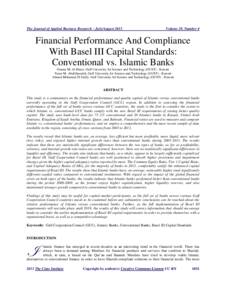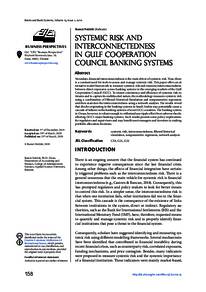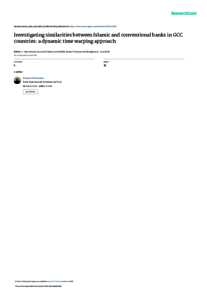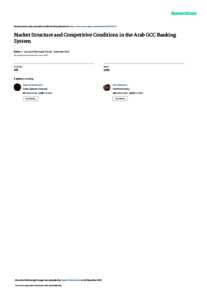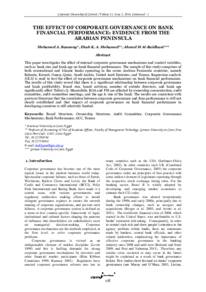Document
Financial performance and compliance with basel III capital standards : conventional vs. Islamic banks.
Identifier
DOI: 10.19030/jabr.v29i4.7914
Contributors
Abu Ghazaleh, Naser M., Author
El-Galfy, Ahmed Mohamed., Author
Publisher
CLUTE Institute.
Gregorian
2013-08
Language
English
Subject
English abstract
This study is a commentary on the financial performance and quality capital of Islamic versus conventional banks currently operating in the Gulf Cooperation Council (GCC) region. In addition to assessing the financial performance of the full set of banks across various GCC countries, the study is the first to consider the extent to which Islamic vs. conventional GCC banks comply with the new Basel III requirements of raising better quality capital. The study uses bank-level data for 75 (55 conventional and 20 Islamic) banks in Kuwait, United Arab Emirates, Kingdom of Saudi Arabia, Oman, Qatar, and Bahrain. Financial ratios are used to measure and compare Islamic vs. conventional banks' performances, and we employ a comprehensive and the most recent sample of data available in the region, consisting of cross-sections from 2003 to 2011. The results reveal that Islamic banks are, on average, less efficient but more profitable, more liquid, more solvent (less risky), and enjoyed higher internal growth rates than conventional banks during 2003-2011. The results indicate that there are statistically significant differences between the two types of banks, as far as profitability, solvency, and internal growth rate ratios are concerned; however, there are no statistically significant differences in liquidity and efficiency. The results also indicate that banks, as a whole, appear to be largely sufficiently capitalized for Basel III. Gulf Cooperation Council banks are well positioned to absorb higher provisions and impairment charges given the higher capital adequacy ratios reported by most. The Common Equity Ratio, Tier 1 Capital Ratio, and Capital Adequacy Ratios (CARs), for the majority of banks in 2011, comfortably satisfy the enhanced capital requirements of Basel III. The results show that Islamic banks have, on average, noticeably higher (and significantly different) capital ratios compared to conventional institutions. With regard to the impact of the global financial crisis on both types of the banks, the results indicate that Islamic banks performed better than conventional banks during the period 2006-2009, as the former enjoys higher capitalization, higher liquidity reserves, and also maintained stronger growth compared to conventional banks in almost countries. Findings of this study may be useful for capital-market participants, as the full set of banks across various Gulf Cooperation Council countries needs to be examined before any substantive conclusions can be reached about the relative performance of Islamic versus conventional banks. Further, as the full implementation of Basel III requirements will not take place until 2019, the results of this study will convey information that should encourage banks to consider the earlier implementation of Basel III capital requirements in order to provide themselves with a reputational boost, as well as a competitive advantage.
Member of
ISSN
0892-7626
Resource URL
Category
Journal articles

